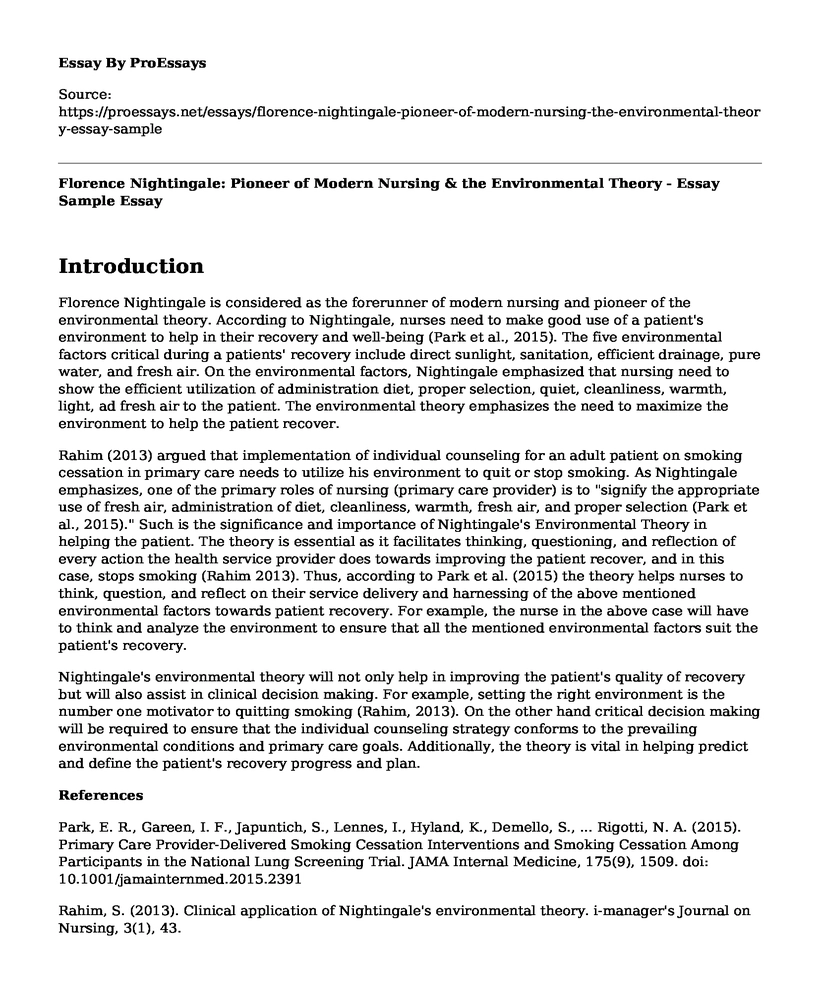Introduction
Florence Nightingale is considered as the forerunner of modern nursing and pioneer of the environmental theory. According to Nightingale, nurses need to make good use of a patient's environment to help in their recovery and well-being (Park et al., 2015). The five environmental factors critical during a patients' recovery include direct sunlight, sanitation, efficient drainage, pure water, and fresh air. On the environmental factors, Nightingale emphasized that nursing need to show the efficient utilization of administration diet, proper selection, quiet, cleanliness, warmth, light, ad fresh air to the patient. The environmental theory emphasizes the need to maximize the environment to help the patient recover.
Rahim (2013) argued that implementation of individual counseling for an adult patient on smoking cessation in primary care needs to utilize his environment to quit or stop smoking. As Nightingale emphasizes, one of the primary roles of nursing (primary care provider) is to "signify the appropriate use of fresh air, administration of diet, cleanliness, warmth, fresh air, and proper selection (Park et al., 2015)." Such is the significance and importance of Nightingale's Environmental Theory in helping the patient. The theory is essential as it facilitates thinking, questioning, and reflection of every action the health service provider does towards improving the patient recover, and in this case, stops smoking (Rahim 2013). Thus, according to Park et al. (2015) the theory helps nurses to think, question, and reflect on their service delivery and harnessing of the above mentioned environmental factors towards patient recovery. For example, the nurse in the above case will have to think and analyze the environment to ensure that all the mentioned environmental factors suit the patient's recovery.
Nightingale's environmental theory will not only help in improving the patient's quality of recovery but will also assist in clinical decision making. For example, setting the right environment is the number one motivator to quitting smoking (Rahim, 2013). On the other hand critical decision making will be required to ensure that the individual counseling strategy conforms to the prevailing environmental conditions and primary care goals. Additionally, the theory is vital in helping predict and define the patient's recovery progress and plan.
References
Park, E. R., Gareen, I. F., Japuntich, S., Lennes, I., Hyland, K., Demello, S., ... Rigotti, N. A. (2015). Primary Care Provider-Delivered Smoking Cessation Interventions and Smoking Cessation Among Participants in the National Lung Screening Trial. JAMA Internal Medicine, 175(9), 1509. doi: 10.1001/jamainternmed.2015.2391
Rahim, S. (2013). Clinical application of Nightingale's environmental theory. i-manager's Journal on Nursing, 3(1), 43. https://ecommons.aku.edu/cgi/viewcontent.cgi?article=1150&context=pakistan_fhs_son
Cite this page
Florence Nightingale: Pioneer of Modern Nursing & the Environmental Theory - Essay Sample. (2023, Feb 27). Retrieved from https://proessays.net/essays/florence-nightingale-pioneer-of-modern-nursing-the-environmental-theory-essay-sample
If you are the original author of this essay and no longer wish to have it published on the ProEssays website, please click below to request its removal:
- Articles Summary on Autism Spectrum Disorders
- Child Welfare Social Work Students Annotated Bibliography
- How a Nurse Leader Helps a Nurse Colleague Pursue Their Professional Goals Essay
- Essay Sample on Pharmaceutical Industry and Information Technology Systems
- Equipoise in Research - Essay Sample
- Essay Example: Informed Consent Form: Patient Rights and Obligations
- Civil War Diseases - Essay Sample







